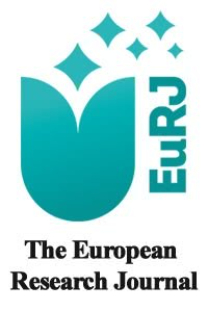Retrospective analysis of patiens with brain death
Objectives: We aimed to retrospectively analyze brain death cases in the our intensive care units. Methods: We examined archive records of brain death cases diagnosed between January 01, 2014 and October 01, 2018. We recorded patients’ demographics (age, gender, place of birth, blood type and diagnosis on admission), time to the preparation of the report, additional tests performed, rate of organ donation, donor rate, and number of organs removed. Results: A total of 151 brain death cases were detected. Of these, 69 were female. The average age was 53.96 ± 19.52years. A Rh + was the most common type (39.7%) in blood type analysis. Intracranial hemorrhage was the primary reason (54.3%) for admission. Apnea test was performed for 88 patients. Radiological imaging was used in 129 (85.4%) cases; computed tomography angiography being the most commonly performed method with 79 (52.3%) cases. Forty four patients’ families consented to organ donation. Considering the place of birth for donors, Marmara Region was the leader with 18 (40.9%) donors. Of the 82 brain death cases diagnosed with intracranial hemorrhage, 35 (42.68%) donated organs and this rate was significantly high (p = 0.002). The mean follow-up period for brain death was 1.49 days. Conclusions: Health team is responsible for identifying brain death and shoud be conscious about it, attempting to increase organ donation. They should act rapidly and avoid wasting time after the diagnosis. Family interviews to be conducted by an experienced and trained organ donation coordinator may increase donations by emphasizing the importance of organ donations. Giving wide media coverage to organ donation may increase awareness of the community of organ donation.
Keywords:
Brain death intensive care, donor,
___
- [1] Koçak Süren Ö. [Legal and ethical examination of organ and tissue transplantation]. TBB Dergisi 2007;73:174-95. [Article in Turkish]
- [2] Akbaş T, Kurtpınar Z, Senadım S, Coban E, Ozkubat V, Bayrak SK, et al. [Analysis of the patients who had brain dead diagnosis in a neurological intensive care]. ACU Sağlık Bil Derg 2018;9:309-13. [Article in Turkish]
- [3] Sabancı PA, Karasu A, Karadereler S, Barlas O. [Diagnosis of brain death]. Sinir Sistemi Cerrahisi Derg 2008;1:81-5. [Article in Turkish]
- [4] Izdeş S, Erkılıc E. [Brain death]. Turkish Medical Journal 2007;1:173-9. [Article in Turkish]
- [5] Organ ve doku alınması, saklanması, aşılanması ve nakli hakkında kanun. Kanun Numarası 6514 Resmi Gazete 18.01.2014-28886.
- [6] Young GB, Shemie SD, Doig CJ, Teıtelbaum J. Brief review: the role of ancillary tests in the neurological determination of death. Can J Anaesth 2006;53:620-7.
- [7] Unal A, Dora B. [Transcranial Doppler ultransonography as a confirmative diagnostic test in brain death: a review]. Turk J Cerebrovasc Dis 2012;18:49-58. [Article in Turkish]
- [8] Erdoğan A. [Donor care in intensive care unit]. S.D.Ü Sağlık Bilimleri Enstitüsü Dergisi 2013;4:136-9. [Article in Turkish]
- [9] Schauenburg H,. Hildebrandt A. Public knowledge and attitudes onorgan donation do not differ in Germany and Spain. Transplant Proc 2006;38:1218-20.
- [10] Karasu D, Yılmaz C, Karaduman İ ,Çınar YS, Pekel NB. [Retrospective analysis of patients with brain death]. Dahili ve Cerrahi Bilimler Yoğun Bakım Dergisi 2015;6:23-6. [Article in Turkish]
- [11] Tatlıdil R, Güney İB, Sanlı EÇ,Yüğünt İ, Öner SÖ. [Brain death: Mersin state hospital experience]. Turk J Nucl Med 2010;19:126-31. [Article in Turkish]
- [12] Battal M, Horoz A, Karatepe O, Çitgez B. [Experience of research hospital in determination of brain death]. Şişli Etfal Hastanesi Tıp Bülteni 2013;47:59-62. [Article in Turkish]
- [13] Jansen NE, van Leiden HA, Haase-Kromwijk BJ, Hoitsma AJ. Organ donation performance in the Netherlands 2005-08; medical record review in 64 hospitals. Nephrol Dial Transplant 2010;25:1992-7.
- [14] Guzeldağ S, Koca U, Ergör OA, Akan M. [Retrospective analysis of adult brain death cases]. Turkiye Klinikleri J Med Sci 2014;34:47-52. [Article in Turkish]
- [15] Kıraklı C, Zeren Uçar Z, Anıl AB, Özbek İ. [The effect of shortening confirmed brain death diagnosis time on organ donation rates in the intensive care]. Dahili ve Cerrahi Bilimler Yoğun Bakım Dergisi.2011;1:8-11. [Article in Turkish]
- [16] Wijdicks EF, Varelas PN, Gronseth GS, Greer DM; American Academy of Neurology. Evidence-based guideline update: determining brain death in adults: report of the Quality Standards Subcommittee of the American Academy of Neurology. Neurology 2010;74:1911-8.
- [17] Facco E, Munari M, Gallo F, Volpin SM, Behr AU, Baratto F, et al. Role of short latency evoked potentials in the diagnosis of brain death. Clin Neurophysiol 2002;113:1855-66.
- [18] International donation and transplantation activitiy, from global observatory on D&T. (Newsletter Transplant of the Council of Europe 2017): http:// www.transplant-observatory.org/Pages/home.aspx
- ISSN: 2149-3189
- Yayın Aralığı: Yılda 6 Sayı
- Başlangıç: 2015
- Yayıncı: Prusa Medikal Yayıncılık Limited Şirketi
Sayıdaki Diğer Makaleler
Erdal Birol Bostancı, Dilek Kazancı, İbrahim Mungan, Serdar Yamanyar, Sema Turan, Hayriye Cankar Dal, Sultan Sevim Yakın
Mert Cemal GÖKGÖZ, Murat BİNAR, Fatih ARSLAN, Bülent SATAR
Şeyma TOY, Ayşegül BEYKÜMÜL, Zeynep Tuğçe AVCI, Raikan BÜYÜKAVCI
Ultrasound-guided percutaneous drainage as an alternative to surgery in treating breast abscesses
Halit Ziya Dündar, Gökhan Gökalp, Rukan Karaca, İsmet Taşdelen, Ömer Fatih Nas, Uğur Topal
Meltem Özdemir, Alper Dilli, Aynur Turan, Seda Soğukpınar Karaağaç
